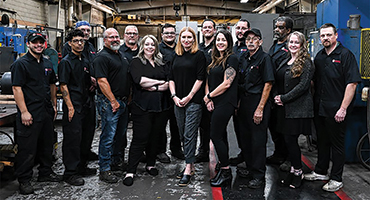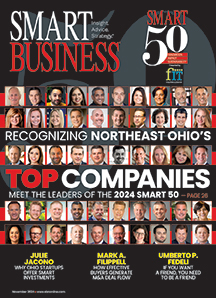For over 75 years, Redmond Waltz’s expert electrical services have kept industries up and running.
“Our core business is repairing the electric motors that run manufacturing — industrial fans and blowers, gearboxes and pumps,” says President and CEO Jennifer Ake-Marriott. “We strive to be a resource for our customers and want to be their first phone call. We don’t claim to do everything, but we will help find whatever they need.”
The company has supported more than 3,000 customers and logged over 97,000 repairs since its founding in 1946. Skilled technicians provide quick turnaround, minimizing downtime for businesses across a wide swath of sectors throughout the state of Ohio and the central United States.
However, when Ake-Marriott stepped up to helm the company in 2013, its future looked bleak. Navigating the unexpected passing of one of the company’s owners, Redmond Waltz was hampered by bankruptcy, wary vendors and disgruntled employees. Inexplicably drawn to what she saw as opportunity, Ake-Marriott was unfazed by her initial challenges. With patient determination, she embarked on rebuilding efforts that started with the corporate culture.
A lifetime of previous experience
Growing up, Ake-Marriott had a front-row seat to her family’s business, Ake Environmental Inc. Founded in 1970 to support drinking and wastewater safety, it expanded to help clients with compliance after the establishment of the Environmental Protection Agency (EPA). Along with her sister, Ake-Marriott worked in the company’s facilities.
“Probably from the age of 12, if there was a little job for us, we were doing it,” she says. “What struck me as I was privy to how employees interpret situations is that no matter how strong a company’s culture may be, when people don’t have all the facts about challenges or changes, they never fill in the gaps with the most positive possibilities.”
In her early 30s, Ake-Marriott ascended to a leadership role within Ake Environmental after the sudden death of her aunt — her dad’s partner in the company. The economic downturn of 2008 soon followed, and Ake-Marriott realized the crucial need to provide employees with context for the struggles they were facing.
“Without forthright communication, your culture will be defined by whoever has the loudest voice, and they are going to dictate what is perceived as truth,” she says. “That was one of the biggest lessons I learned the hard way after I became president of my family’s business.”
Early days at Redmond Waltz
Before Ake-Marriott joined Redmond Waltz, many inside and outside the organization questioned its viability.
“The company was really on its heels and needed new leadership, but their challenges were not scary from my perspective,” she says.
“I saw this company in peril. The owner was grieving his wife, and I knew the wrong person coming in would likely cut their way to profitability.”
Seeing something worth saving, Ake-Marriott sensed that employees needed investment and someone who would focus initially on stability over profit.
“How do we rebuild the foundation of this organization and get it moving in the right direction?” she says.
Leading with transparency, she started having conversations.
“One of the first things I did was speak to everybody in the company to understand the popular narratives,” she says. “What was the mythology? If I was not addressing that, we were going to have problems.”
As she studied the business, Ake-Marriott asked countless questions: “What is our capacity? How much do we need to make to be profitable? What is the value of the work we are producing? Are we doing work that we cannot currently afford?”
After a thorough analysis, the next steps were forging a path forward and presenting the plan to everyone from the sales team to the mechanics on the floor.
A fresh start
The team celebrated every achievement.
“First, it was the four-week average and then the 12-week average,” says Ake-Marriott. “We focused on incremental goals and made sure everybody understood the process we were taking.”
If some tough decisions were temporary, she told employees that. When customers or vendors questioned the prior bankruptcy, she encouraged the sales team to speak candidly.
“If you are not feeling great about the organization you represent, how are you out there selling?” she says. “Nobody wants to see another company fail. People are willing to work with you if you have a realistic plan.”
Slowly, Redmond Waltz rebuilt relationships, and everything started to click into place.
Today, Redmond Waltz is thriving and contemplating a larger facility. Revenue has tripled over the past decade, and industry leaders know they can rely on the company for routine maintenance and urgent repairs.
“It is about meeting customers where they are,” Ake-Marriott says. “As a smaller company, we have the advantage of developing seamless, gratifying relationships because we truly know these people and their needs.” ●



